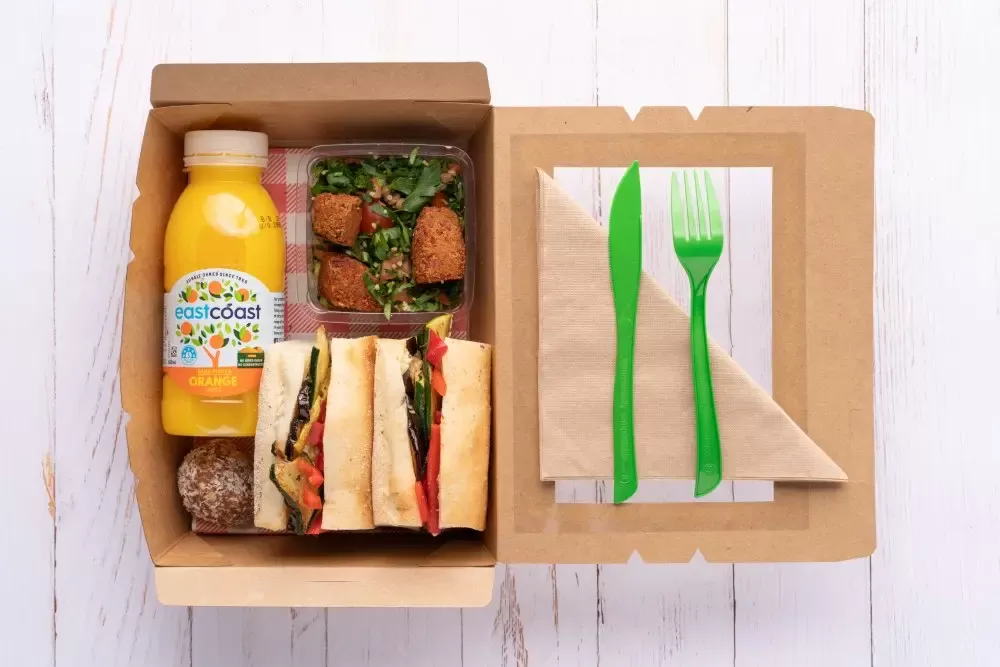The Ultimate Guide to Catering for Dietary Restrictions: How to Delight Every Guest
When planning the food items for a staff party or board meeting, you have to be aware of special dietary needs. People take these restrictions very seriously, and the extent to which your menu caters to dietary restrictions can make or break your reputation. But if you don’t even know what the dietary requirement actually is, catering for dietary restrictions is impossible.
Dietary restrictions are a type of food restriction that often relates to mitigating and managing particular health problems. They help people keep their weight, blood sugar, and cholesterol in check. Besides, allergies and religious points of view can also restrict the foods one can eat. People can be vegetarians, vegans, dairy intolerant, etc., based on their particular restrictions.
This article will help you understand special dietary needs when planning your next event. We will also give some important tips that you’ll find handy in planning such events.
Understanding Dietary Restrictions for Catering
Meeting the needs of people with special dietary needs is more common than ever. This is because many Australians live with food intolerances or allergies. Besides, some people are going on voluntary diets.
However, to meet such needs, it is first important to know what kind of special dietary needs they may have. Usually, they fall into one of these three groups:
Special Dietary Requirements
Your guests may have dietary restrictions for weight loss, pregnancy, or personal preferences. This may include:
Vegetarian
It’s absolutely clear that vegetarians don’t consume meat. However, there are several types of vegetarians, usually classified as follows:
- Lacto-ovo: Avoids all meats but eats dairy and eggs; this is the most common type of vegetarian
- Lacto-vegetarian: Does not consume eggs or meat but does consume dairy products
- Pescatarian: Eats seafood as the only source of meat in an otherwise vegetarian diet
Vegan

Vegans eat only plant-based foods and avoid all animal products such as meat, eggs, and dairy. Avoiding meat products is relatively simple. However, making an entire meal vegan-friendly can be difficult. That’s because many foods contain animal products that you might not expect.
Nevertheless, veganism is growing in popularity. Hence, the number and types of vegan catering options are enormously increasing.
Keto Diet
The keto diet is a brief form of the ketogenic diet. It is a low-carb, high-fat plan. It promotes weight loss and health benefits by causing ketosis, which burns fat for energy. It requires less than 50 grams of carbs per day, increasing fat consumption.
This diet’s main foods are avocados, nuts, olive oil, lean meats, and non-starchy vegetables. It doesn’t allow high-carb items like grains and sugar. The keto diet is effective for weight loss, diabetes, and epilepsy. However, it requires professional consultation and nutrient intake.
Pregnancy Diet
Your pregnant guests should stay away from certain foods that could make them sick or cause complications for their baby. These foods usually include:
- Cheeses like mould-ripened or soft cheeses
- Pate
- Raw or undercooked meats
- Cold deli meats
- Raw or partially cooked eggs
- Fish high in mercury
- Beverages such as alcohol, caffeine, and energy drinks
Food Allergies and Intolerances
A food allergy occurs when your immune system adversely reacts to a food when it’s not supposed to. However, your immune system does not cause food intolerance. The majority of the time, it is a digestive issue.
No matter what the case is, you are likely to receive guests who will look for the following restrictions:
Gluten-Free / Coeliac Disease

Gluten is a protein found in common grains such as wheat, barley, and rye. Gluten intolerances cause discomfort. On the other hand, coeliac disease causes autoimmune gluten attacks on intestinal tissue. People with both of these conditions react to foods made with the aforementioned grains.
Some alternatives in such cases can be gluten-free bread and pasta, rice, and legumes. As gluten-free diets have grown in popularity, catering options have also expanded. Hence, it is easier to find tasty gluten-free meals.
Dairy Free / Lactose-Free
Dairy intolerance manifests as symptoms such as bloating after consuming dairy products. Conversely, lactose intolerance is an autoimmune response. It affects proteins such as whey and casein. Lactose-intolerant individuals struggle to digest lactose (a type of sugar) in dairy products like cheese and ice cream.
In both cases, individuals can use alternatives such as soy or almond milk.
Nut Allergies and Anaphylaxis
There is a difference between an allergy and anaphylaxis. This applies to all forms of allergies, from nut allergies to shellfish allergies and other forms of food allergies.
A nut allergy can cause a rash and throat and/or eye irritation. Conversely, anaphylaxis is a life-threatening allergic reaction. It causes the body to release too many chemicals. These chemicals affect the respiratory and cardiovascular systems.
In terms of nut allergies, some people react to all or most nuts. On the other hand, others may only react to specific nuts, like peanuts or tree nuts.
Religious Dietary Restrictions
Religiously devoted people give supreme importance to the food they consume. For example, religions like Islam consider eating forbidden foods to be a major sin. Usually, this type of dietary restriction falls into the following categories:
Halal

Halal meats are prepared in accordance with Islamic guidelines. The slaughtering needs to be done according to Sharia law. Besides, meats like pork and ham are not permissible to consume. Alcoholic beverages are forbidden as well.
There are several halal-certified suppliers who can provide halal meat and poultry upon request.
Kosher
Kosher foods are prepared in accordance with Jewish dietary regulations. Kosher meat can only be derived from animals with split hooves that chew their cud, such as cows, sheep, and goats.
Kashrut law also governs slaughter and processing methods, as well as slaughterhouse equipment.
Catering for Dietary Restrictions: Tips to Remember
As you are well equipped with the different dietary restrictions out there, you should now focus on catering. Before you talk to the catering service, you should keep the following tips in mind:
Ask for Dietary Requirements When Ordering Catering
Before hiring a catering service, it is critical to know if any of your guests have special dietary needs. If you are hosting or planning an event, it is your job to make sure that all of your guests have a good time with the food. Besides, the food you serve must fit their diets. Hence, you should definitely include any dietary needs in your catering order.
Collaborate With the Catering Service
Communicating and collaborating well with the catering service is key to making sure that special requests and dietary needs are met. You can not let cross-contamination or ingredient mix-ups happen. Make sure the kitchen staff of the catering service knows exactly what the guests want. Assist them in locating suitable options or changes to meet specific requirements.
Offer Alternative and Creative Options
It is important to offer creative and different options for guests who have to follow certain diets. Give people a choice of dishes that suit their tastes. This may include gluten-free, vegetarian, or vegan options.
Try out new flavours, ingredients, and cooking methods to come up with new and interesting options. Special diet guests can have a memorable and varied dining experience if you offer creative and tasty options.
Conclusion
Dietary restrictions prevail in today’s world. Whether it’s for medical reasons or some casual dieting, you will often find guests on strict diets. They can be vegetarians or vegans. Besides, there might also be guests who are gluten- or lactose-intolerant at your event.
And then there are religious restrictions. No matter what restrictions there might be, you have to serve them appropriately. Otherwise, your event’s purpose might remain unfulfilled. Having a good collaboration with the catering service can turn out to be pivotal here.
If you are in Sydney, then the Catering Zone can help you out here. We have the expertise and reputation that we strive to defend. With us, you can be sure that all dietary restrictions are strictly maintained. Contact us today to get the best catering service for your next event.









